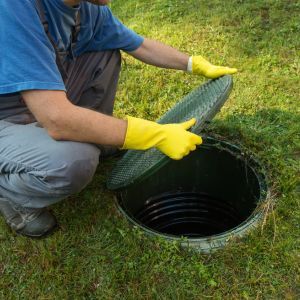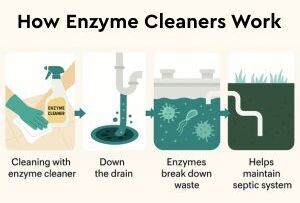Why Enzyme Cleaners Are Essential for Healthy Septic Systems
Septic systems are critical to many New Zealand businesses, especially those in hospitality, aged care, education, and rural facilities. A poorly maintained septic system can cause foul odours, slow drainage, costly repairs, and even compliance issues under NZ’s health and hygiene regulations. One of the most effective, eco-friendly ways to maintain septic health is through the regular use of enzyme cleaners.
The Role of Enzymes in Septic System Health
Septic tanks rely on beneficial bacteria to break down waste. However, the use of harsh chemical cleaners, bleach, and disinfectants can kill these bacteria, disrupting the system and causing waste build-up.
Enzyme cleaners support septic health by:
-
Activating good bacteria: Enzymes provide a natural boost, helping beneficial microbes digest fats, oils, proteins, and starches.
-
Breaking down organic waste: Enzymes speed up the natural decomposition process.
-
Preventing odours: By eliminating the source of smells, enzymes keep septic systems fresher.
-
Supporting eco-friendly maintenance: Enzymes are biodegradable and safe for the environment.
How Enzyme Cleaners Work Beyond the Drain
One unique benefit of enzyme cleaners is their versatility. For example, after cleaning floors or surfaces with an enzyme solution, tipping the rinse water down a toilet or drain allows the enzymes to continue working in the septic system. This makes them an efficient option for facilities looking to reduce waste and maximise the effectiveness of their cleaning supplies.
Enzymes continue to function in the tank for hours or days, depending on conditions, supporting the natural bacterial balance. Over time, this reduces scum layers, keeps the system flowing more smoothly, and minimises the chance of sudden blockages.
Benefits for NZ Commercial Businesses
-
Cost Savings
Reduce the frequency of septic tank pump-outs and emergency call-outs. -
Compliance & Hygiene
Maintain standards required under NZ workplace and food safety regulations. -
Safer for Staff & Customers
Unlike caustic chemicals, enzyme cleaners are non-toxic and safer to handle. -
Sustainability Goals
Enzymes align with NZ businesses’ push toward eco-friendly and low-impact cleaning solutions. -
Improved Workplace Environment
By eliminating odours, enzymes contribute to a cleaner, fresher atmosphere for staff and customers.
Risks of Ignoring Septic Hygiene
-
Foul odours that affect staff morale and customer experiences.
-
Overflow and backflow incidents that can cause serious health hazards.
-
Expensive emergency repairs from collapsed drain fields or blocked systems.
-
Regulatory penalties if facilities fail to meet hygiene and safety standards.
These risks far outweigh the cost of regularly using enzyme cleaners as a preventative measure.
What Experts Say
Industry resources such as Plumbing Connection and guidance from Master Plumbers NZ emphasise the importance of protecting septic systems from the harmful effects of harsh chemicals. Enzyme-based cleaners are consistently highlighted as a safer long-term solution that supports both septic function and workplace safety.
For more detail on why avoiding harsh chemicals matters, see our related article Cleaners and Septic Tank Care. It explains how quaternary ammonium compounds (quats) and other harsh chemicals can kill the microbes essential for separating waste in septic systems and can also leach into waterways, harming surrounding ecosystems.
Best Practices for Using Enzyme Cleaners in Septic Systems
-
Consistency is key: Apply enzymes on a routine basis (monthly or weekly depending on use).
-
Avoid mixing with harsh chemicals: Chemical residues can kill the bacteria enzymes are designed to support.
-
Use at the right time: For best results, apply enzymes during low-flow periods (e.g., at night) so they can work without being flushed out too quickly.
-
Pair with good septic habits: Avoid flushing fats, oils, and non-biodegradable items that overwhelm the system.
FAQ – Enzyme Cleaners and Septic Systems
Can enzymes replace septic pumping?
No. Enzymes reduce build-up but do not remove solids. Pumping is still required as part of regular septic maintenance.
How often should enzymes be used?
Monthly treatments are recommended for most commercial systems, with more frequent use in high-volume facilities.
Are enzymes safe for all septic tanks?
Yes. They are compatible with both traditional and modern septic systems.
Can enzymes fix an existing blockage?
They are best for prevention. Severe blockages may still require professional servicing.
Can enzymes improve drain field performance?
Yes. By breaking down waste more efficiently, enzymes can help reduce the load on drain fields, extending their lifespan.
Final Thoughts
For NZ businesses, keeping septic systems healthy is essential for hygiene, compliance, and cost control. Enzyme cleaners offer a safe, eco-friendly, and cost-effective way to maintain septic health by supporting beneficial bacteria, reducing odours, and preventing costly issues.
At Insinc Products, we supply a wide range of enzyme-based cleaning solutions designed for commercial workplaces. Contact us today to learn how enzymes can help your business maintain healthy septic systems and meet hygiene standards.
Posted: Saturday 20 September 2025



